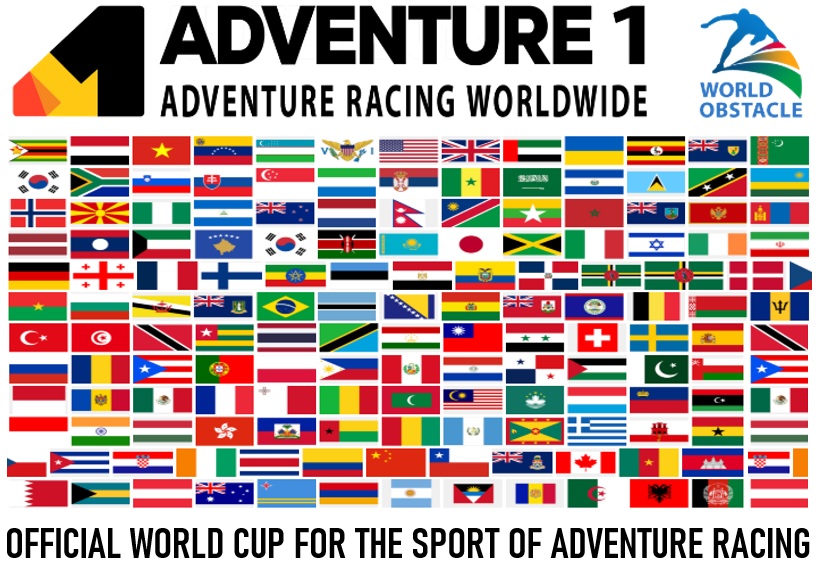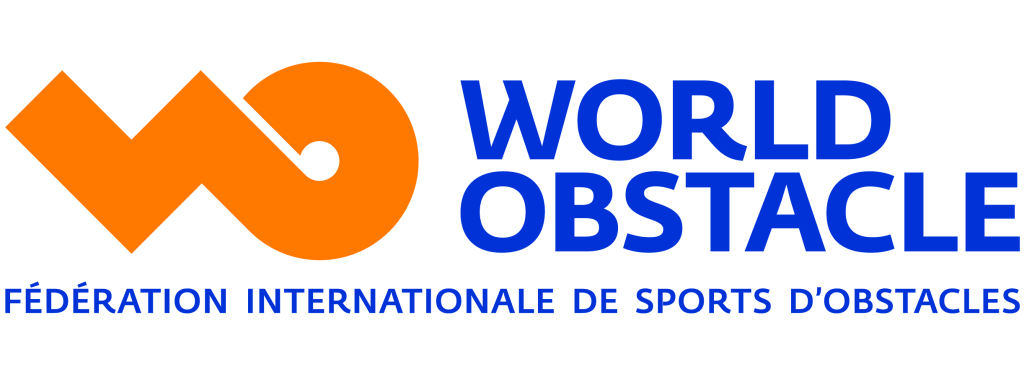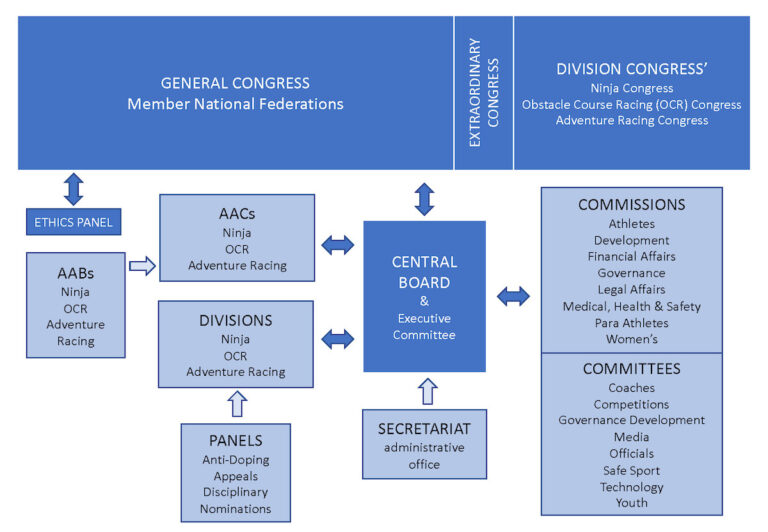World Obstacle is a member based, democratic, not-for-profit organization that exists to represent the needs of its members (the athletes, national federations and their obstacle sports communities), and meet requirements specified by the International Olympic Committee to be recognized as an international sport. Unlike commercial organizations that produce championship events, World Obstacle does not exist for its own gains.
Athletes, clubs, teams and associations are the members of the national federations and lead the committees, commissions, boards and executive branches. This is a democratic system by and for the athletes to represent their interests and provide a pathway to the highest level of international sport.
World Obstacle facilitates safety, fairness and opportunities for athletes to compete at every level, including the FISO World Championships, World Series, World Cups and Continental Championships. This includes international results and rankings, officials, training, rule enforcement, insurance services, coaching, training camps, event information, event services, news, education, adjudication and more.
MISSION
The Mission of World Obstacle is to promote the Obstacle Sports including, but not limited to Ninja, OCR and Adventure Racing throughout the world, to lead Obstacle Sports, and meet the requirements as specified by the International Olympic Committee and the International Paralympic Committee. We promote World Series, World Cups, and World Championships in each sport for our member federations and their athlete members.
NATIONAL MEMBER FEDERATIONS
The Fédération Internationale de Sports d’Obstacles (FISO) members are composed of National Member Federations administering Obstacle Sports and their related Disciplines and Events. Each National Federation (NF) belongs to one of the four Continental Confederations; Obstacle Sports Federation Africa, Obstacle Sports Federation Asia Pacific (including Oceania), Pan American Obstacle Sports Federation, and the European Obstacle Sports Federation.

CONGRESS
The Congress is the General Assembly of the member National Member Federations and the highest authority of World Obstacle. The Congress meets every two years at a date and venue specified by the Secretary-General and is the platform for representation of the needs and interests of the athletes.
CENTRAL BOARD
FISO’s top-level executive branch, the Central Board’s role is to supervise the practice of obstacles sports worldwide. It is composed of the President, the Secretary-General the Treasurer, the President of each Continental Confederation and 13 additional members of the Continental Confederations and must include at least one female.
EXECUTIVE COMMITTEE
The Executive Committee manages the property and business of FISO. Between the meetings of the Central Board, the Executive Committee exercises the powers of the Central Board as per the FISO General Statutes.
COMMITTEES
Committees are working groups that are advisory to the commissions, Central Board, Executive Committee and Congress. It is the responsibility of the members of each of the Committees to support FISO’s efforts to develop Obstacle Sports, disciplines and events. The organisation of FISO includes the following committees:
- Coaches
- Competitions
- Diversity
- Economic Development
- Ethics
- Finance
- Governance Development
- Masters,
- Media
- Officials
COMMISSIONS
The organisation of FISO includes the following commissions: Athletes, Development, Governance, Legal Affairs, Medical Health and Safety, Para-athlete, Technical and Women’s. The Commissions act in a consultative capacity and do not exercise executive authority. It is the responsibility of the members of each of the Commissions to support FISO’s efforts to develop Obstacle Course Racing and related Sports.
OBSTACLE SPORTS GOVERNANCE STRUCTURE
EVENT REQUIREMENTS
All teams, entourage, spectators, service providers, contractors and associated individuals and organizations are required to uphold the highest standards of ethics, professionalism, moral conduct and behaviour expected for world level events. The following standards, guidelines and policies are included as part of these requirements:
- Event Sustainability Management System, International standard ISO 20121
- Responsible Business Practice & Preventing Corruption in Sporting Events
- Anti-doping to meeting World Obstacle requirements and the World Anti-Doping Agency Code
- Medical, health, and wellness event practices to World Obstacle international standards
- Event operation and safety practices meeting World Obstacle and ASTM International standards
- Athlete wellbeing, including Safeguarding to World Obstacle international standards
- Access and Sport for All, including Para Athletes, Diversity, and Transgender
- Ethics and professional Conduct
- SOURCE
COMPETITION RULES
World Obstacle Competition Rules is the Master Source Document (MSD) for Obstacle Sports. Each obstacle discipline or event has specific rules that reference the MSD.
These documents are the official (authorised) reference documents and are maintained in accordance with recommendations by the World Obstacle Technical Committee and Competitions Committee and accepted by the World Obstacle Executive Committee.
PURPOSE
- The World Obstacle Technical Committee (TC) will ensure technical aspects of World Obstacle competitions are of the highest quality;
- The World Obstacle Competition Rules specify the conduct and behaviour of athletes during World Obstacle competitions.
- The World Obstacle Event Organizers’ Manual and its related documents set safety and logistical standards for host National Federations (NFs) and for the Local Organizing Committees (LOCs);
- The World Obstacle Technical Officials’ (TO) Certification Program sets the standards for certifying World Obstacle Technical Officials;
INTENTION
The World Obstacle Competition Rules are intended to:
- Create an atmosphere of sportsmanship, equality, and fair play;
- Provide safety and protection;
- Emphasize ingenuity and skill without unduly limiting the athlete’s freedom of action;
- Penalise athletes who gain an unfair advantage;
Download a printable version of the full competition rules below:
RESPONSIBLE BUSINESS PRACTICES
Responsible Business Practice & Preventing Corruption in Sporting Events
World Obstacle promotes policies designed to improve the economic and social well-being of people in sporting events around the world. We follow best practices as specified by the Organisation for Economic Co-operation and Development (OECD) that provides a forum in which governments and organisations work together to share experiences and seek solutions to common problems.
The OECD guidelines for Preventing Corruption and Promoting Responsible Business Conduct when Organising Sporting Events are followed for all World Obstacle events and are recommended for events of all national member federations. The World Obstacle Ethics Committee works with event producers to oversee best practices.
To learn more about these guidelines, click this link.
SUSTAINABILITY IN EVENT MANAGEMENT
World Obstacle is committed to a healthy planet and the global environment. We use the international standard ISO 20121 Event Sustainability Management System, to ensure the sustainability of events in the World Obstacle system. This standard was developed for use at the 2012 London Olympic Games and is the global benchmark for sustainable events.
ISO 20121 is a management system standard that has been designed to help organisations in the events industry to improve the sustainability of their event-related activities, products and services. ISO 20121 helps World Obstacle race producer and directors:
- Be financially successful
- Become more socially responsible
- Reduce their environmental footprint
CENTRAL BOARD
World Obstacle’s top-level executive branch, the Central Board’s role is supervise the practice of obstacle sports worldwide. It is composed of the President, the Vice President, the Secretary-General, the Treausrer, the President of each Continental Confederation and up to there additional members of the Continental Federation (must include at least one female). The Central Board may also co-opt additional members for the vision, skill and special expertise that they will bring to the sport.
The Central Board appoints the Secretary-General and the Deputy Secretary-General. The term of office of the Central Board is four years, beginning after the last day of each elective Congress. The Central Board reports to the Congress. It holds two ordinary meetings annually. If deemed necessary, the President and Secretary-General may also call extraordinary meetings.


